WRITTEN BY WILL MOYER LAURIN ’25
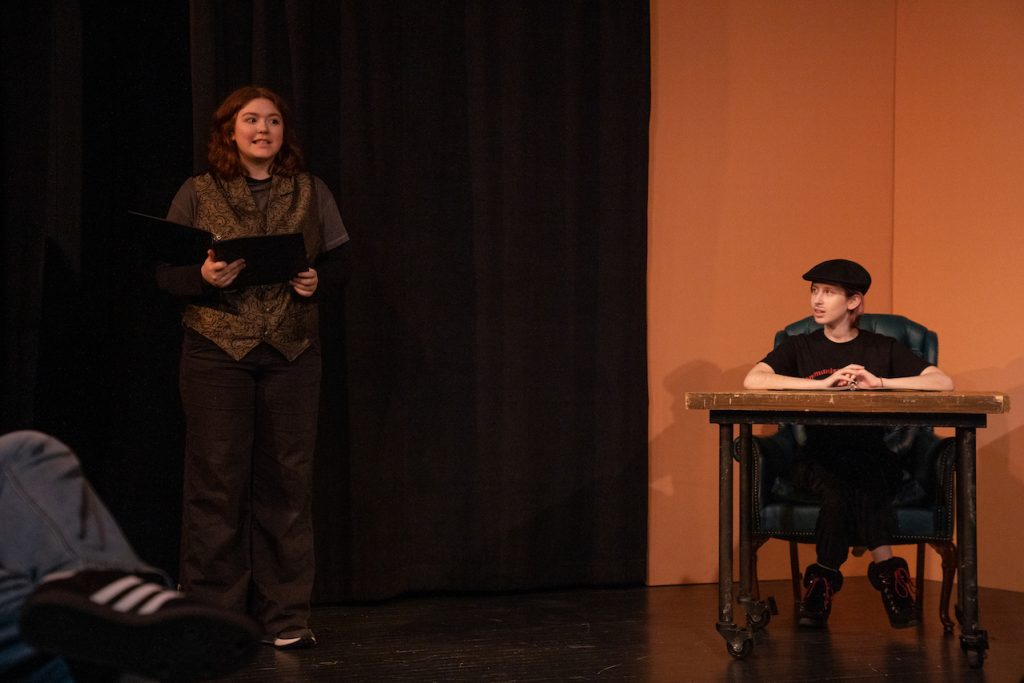
Watching Skidmore’s studio lab production of The Great Impresario Boris Lermontov Would Like to Invite You To Dinner by Tristan B. Willis is a unique experience as we watch the actors delve into an absurd realm of uncertainty, chance, and abstraction. Directed by Skidmore Theater student Micah Plfaum, the play is more of a theatrical experiment than a traditional performance with actors Hunter Wolf ’25 and Sophie D’Amore ’26 having no idea which character they are going to play until the show begins. The outcome of a single on-stage dice roll determines who will be the impresario Lermontov, and who will be their servant Noa. On the night of their first performance, the dice roll casts Sophie D’Amore as Lermontov and Hunter Wolf as Noa, while on the second night, the roles reverse.
The show opens with a brief shadow puppet performance by puppeteer Kat Nazarov ’25, showing a mustached face with sunglasses and a beret dancing against a salmon-colored wall. In front of the wall is a comfy chair and a small table with props resembling the accessories of the shadow puppets; adjacent is a partially stacked bookshelf with a bouquet of white roses on top. The actors slowly emerge from the curtains and approach the table with unease. They then roll the die to determine their parts. They acknowledge chance’s decision and the actor playing Lermontov dons the beret and draws a mustache above their lip. Still, a sense of unease remains among the performers and they reassure one another that they are content with their roles and will be there for each other. The actor playing Noa puts on a waiter’s vest and exits the stage, the lights warm, and we enter the realm of the play.
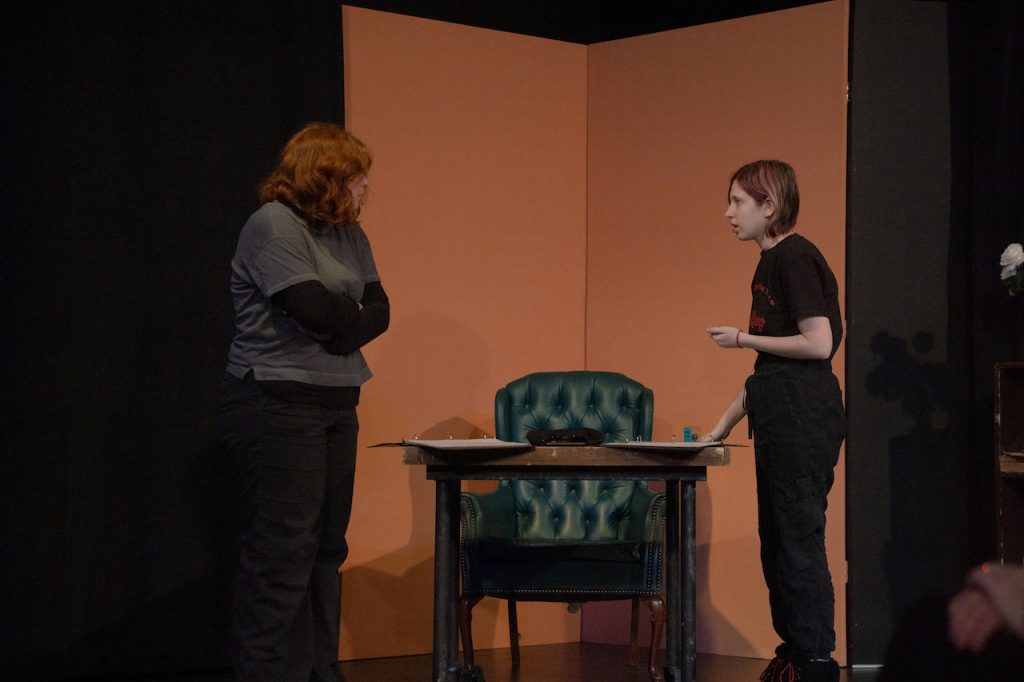
The audience now plays the role of an invited dinner guest seated at Lermontov’s table. Lermantov is an impresario, an organizer of ballet and theater shows with an oversized ego. He monologues to the audience with D’Amore’s performance tactfully revealing his narcissism and tendency to suppress his emotions as he buries himself in his work. Noa enters and the awkwardness between the two characters is palpable; Noa attempts to play the role of the dutiful servant whose name Lermontov can’t even remember. As Lermontov attempts to continue their self-indulgent monologue, Noa challenges them, revealing their boss to be an unreliable narrator and an exclusionary whose outdated vision of how ballets should be run results in the abuse of their staff. Although Lermontov is in charge of Noa, Noa’s speeches command the stage; Wolf’s performance of Noa adeptly brings out the character’s authenticity and provides a satisfying contrast to Lermantov’s disingenuousness.
When things get too heated between the two characters, the in-character actor for Noa pleads with their fellow actor to work with them, highlighting the destructive nature of Lermantov’s character to the actor. Several more outbursts occur and it becomes apparent that Lermantov’s actor is experiencing something more sinister, perhaps the struggle against the role’s overwhelming abusive nature.

Every time Lermontov tries to regain control, first by passing on the story of the Little Mermaid as the original inspiration for a new ballet and then searching for comfort in a critic’s review of their ongoing show The Red Shoes, they are thwarted by others’ criticism.
The reviewer lambastes Lermaontov’s ballet and Noa points out that the company is falling apart due to it being understaffed with overworked and underpaid workers. Despite Noa’s pleas, Lermontov doesn’t seem to care. In fact, he performs another self-indulgent monologue meant to describe the things he “doesn’t like about himself”, a speech that only reaffirms his privilege and perpetual state of self-entitlement. During the monologue, however, Lermantov is grieved and pained over references to a “lost dancer,” a topic the character carefully treads around.
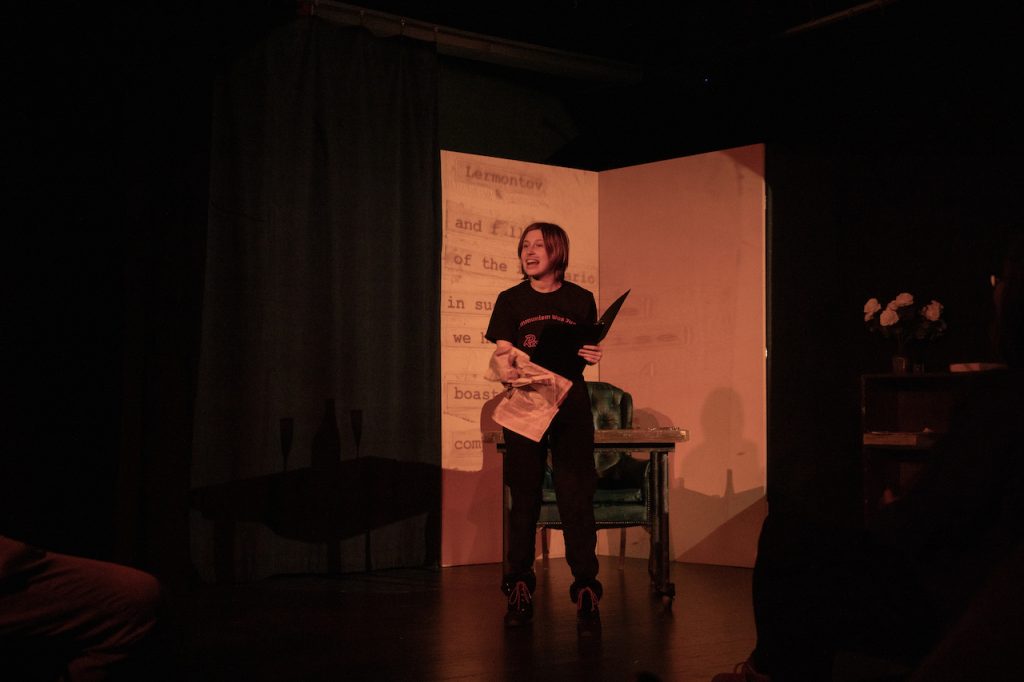
As the play progresses, Lermontov continues to mistreat Noa who stands defiant against the abuse until the two have a passionate debate about the purpose of art. As their emotions culminate and the argument coalesces into a barrage of insults, the two decide to dance as a form of release. The dance proves to be a genuine moment between the two adversaries. In fact, Noa looks content and in control while dancing with Lermontov, almost as if they enjoy it. Meanwhile, silverware shadow puppets twirl behind them. The pleasant moment is shattered with a recording of Lermontov comparing dancers to kitchen utensils as if they were tools, drastically changing the temperature in the room.
Lermontov rushes off-stage and Noa is left alone. The lights begin to fade as Nora does their own version of Lermontov’s “things I don’t like about myself” monologue, a moment of sheer vulnerability. Noa’s monologue is authentic and relatable; they are a victim of childhood trauma, capitalism, and depression. The actor’s performance helps illustrate Noa’s complexity and imperfection, a figure simply making use of what they have been given.
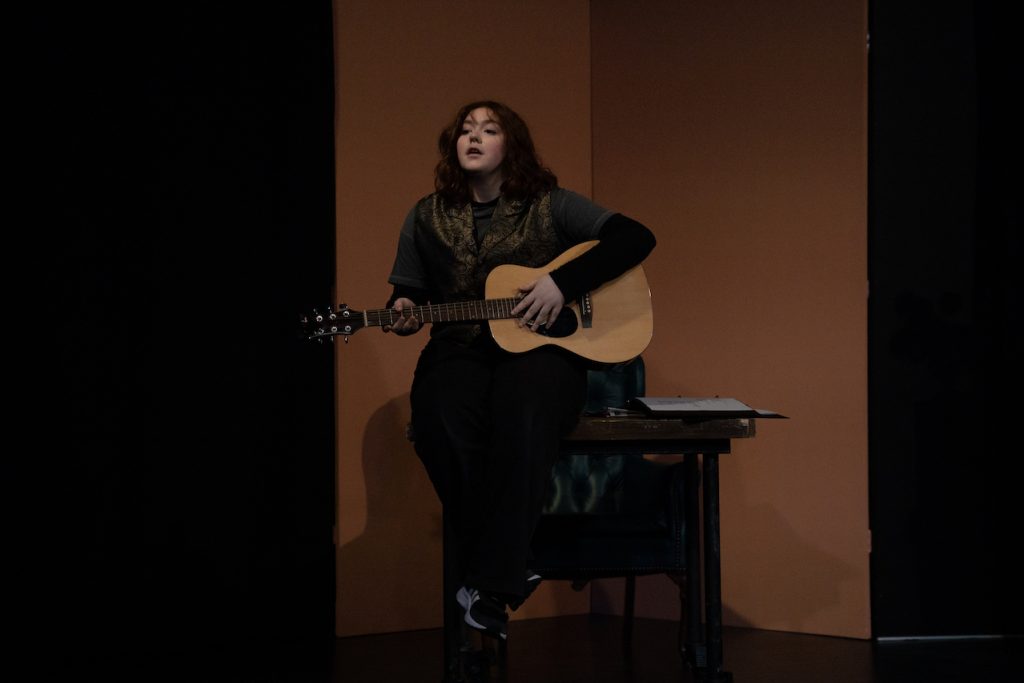
Then a magical moment on stage occurs whose breadth can only be fully appreciated by seeing both nights’ performances: the actors show off their talents as Noa. On the first night, Wolf performs a spectacular juggling routine, while on the second night, when the roles are reversed, D’Amore serenades the audience with a beautiful song and guitar playing. The scene stands out as a moment of authenticity in an otherwise abstract and absurdist play.
Lermontov returns to the stage and snaps Noa’s actor back to reality and into character; he is impressed by Noa’s dancing but continues to demean them. Noa strikes back by revealing to the audience the truth about Lermontov’s “lost dancer”, a prima ballerina who Lermontov had overworked to death which alludes to the play’s inspiration, the 1948 film The Red Shoes. This final revelation catalyzes Lermontov’s descent into madness which culminates in their death. The white roses that loomed in the background before are now funeral bouquets. Noa performs a half-hearted eulogy for Lermontov with an air of spite but also pity- things could’ve been different. Suddenly, the actor who plays Lermontov bursts back onto the stage and pleads for their costume to be removed. Noa’s actor helps them, fulfilling the promise they made at the start of the play.
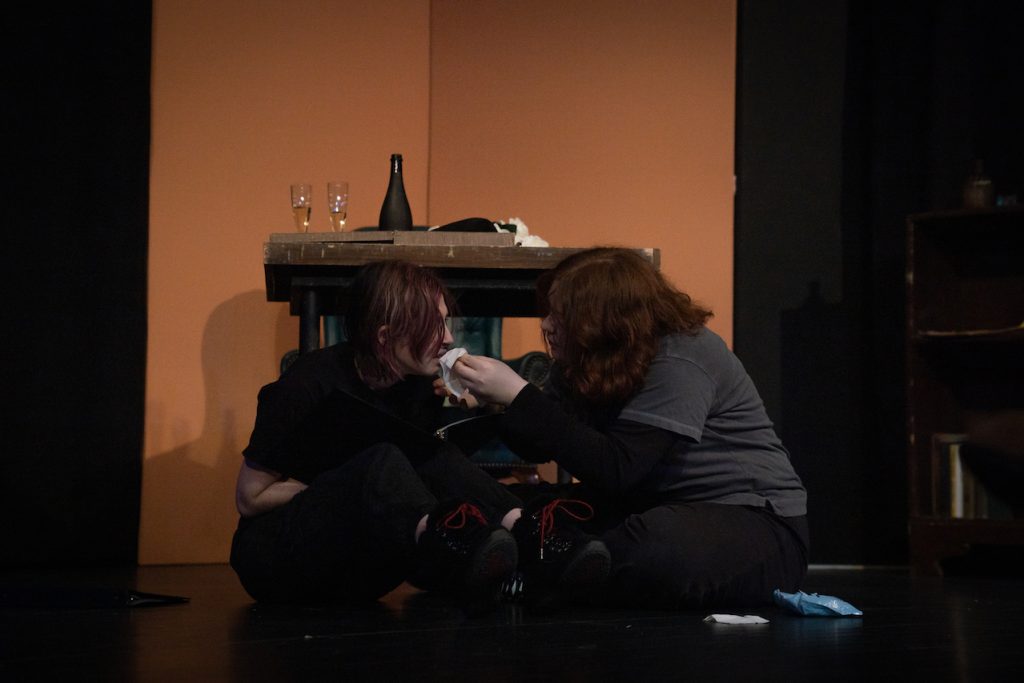
In the end, Micah Plfaum’s The Great Impresario Boris Lermontov Would Like to Invite You To Dinner presents a humorous and dark introspection of the dynamics between actor and employer. Sophie D’Amore and Hunter Wolf do a magnificent job of capturing the tension, awkwardness, and passion that pervades the script, culminating in a truly unique theater experience that leaves the audience wanting more.
Photos by Coltrane Cho ’24
***
Will Moyer Laurin ’25 is a staff writer for the Skidmore Theater Living Newsletter
